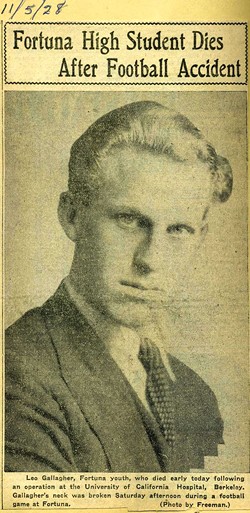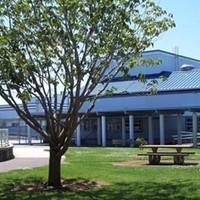
Courtesy of the Fortuna Depot Museum
A photo of Leo Gallagher (seated second from right) as an officer of the Boys' League in the 1928 Fortuna Union High School Megaphone yearbook.
[
{
"name": "Top Stories Video Pair",
"insertPoint": "7",
"component": "17087298",
"parentWrapperClass": "fdn-ads-inline-content-block",
"requiredCountToDisplay": "1"
}
]
These three headlines tell a story:
"Ferndale Invades Fortuna," Humboldt Times, Nov. 3, 1928. "Fortuna High Student Dies after Football Accident," Humboldt Times, Nov. 5, 1928. "Leo Gallagher Funeral Held," Humboldt Times, Nov 7, 1928.
I'd heard of a period when there was no football at Fortuna High School due to the death of a student athlete, but I never knew the story until an article about the incident by Alex Service, a museum curator at the Fortuna Depot Museum showed up in my faculty mailbox at Fortuna High. It was titled, "Tragedy in Fortuna."
It was so interesting, I shared it with my classes. The story is heart-wrenching but it also gives some insight into the differences in society between then and now.
Leo Gallagher lost his dad to pneumonia when he was in eighth grade. By the late fall of his junior year in high school, he had joined his dad in the cemetery on Newburg Road.
In 11th grade, his first year playing football, Gallagher had become particularly good. He was considered one the premiere players in the league of four local high schools: Eureka, Ferndale, Arcata and Fortuna. Eureka had already won the championship but the teams in the league had a lot of parity and any Ferndale vs. Fortuna football game was going to be a thriller, even in 1928.
A dark, dank and rainy day of football was planned in Fortuna that Saturday, the last game of the season. The field was a muddy mess when Gallagher went in for a tackle early in the game. He slipped, falling headfirst into the knee of the oncoming rusher, but he never lost consciousness. Coach Bob Damon was quickly on the field. As the coach knelt next to him, Gallagher told him he could not move his arms or his legs. He was sent by ambulance to Dr. W.H. Comfort in Fortuna, then to the Union Labor Hospital in Eureka and then immediately that night by train to specialists in Berkeley with his mother by his side.
Gallagher, whose neck was broken, died after an operation at 2:30 a.m. The school was stunned by the death of this active popular student who had been instrumental in band, theater, the glee club, journalism, as yell leader and in many other activities.
A huge funeral was held in the gymnasium and attended by students from all four county high schools. The band and school orchestra played his favorite songs. The invocation included a story of how Gallagher, knowing the seriousness of his injuries immediately, wished to apologize to any faculty member he may have wronged in any way.
The 1927 athletic policy that Gallagher and all the male athletes in a season of sport pledged included such things as refraining from the use of tobacco, drugs and liquor, much like today's athletic code. But it also contained vague provisions such as to "not stay out late at night" and "clean living and right thinking." Girls, who did not yet compete in sports, weren't asked to sign such contracts.
For coaches and administrators now, it is often impossible to enforce aspects of the athletic code related to such things as late night parties. Imagine someone being ruled off a team for not engaging in "right thinking" or "being out too late."
What struck me most in Service's article was this: The following spring of 1929, the student body was asked to determine by vote whether to continue football in the coming fall or abolish the program. In a vote of 247 to 83, students voted overwhelmingly in favor of dropping the sport, deeming it too dangerous. Coach Damon was trained in golf over the summer, the school purchased a few golf clubs, golf became part of gym curriculum and replaced football as the new fall sport.
My favorite people are teenagers but I feel their judgment is sometimes impaired. The families and students could have "voted" for football the next fall by participating or not, or the school board could have decided. Imagine a student body voting on such a major issue now.
Football didn't come back to Fortuna High School until the fall of 1945, the end of World War II, when, after 16 seasons had passed, Damon returned as coach.
We know football is dear to Fortuna and the program is one to be emulated. There is still some fading hope for some competitions in athletics this year but team practices have been put on hold for all sports again, at least until Jan. 13, according to the California Interscholastic Federation.
I hope children and teens can stay active and keep at least some semblance of teams in 2021. One possibility would be that people making decisions during these dangerous times could choose some lower-risk COVID-19 sports such as cross country over wrestling, tennis over basketball and even golf over football. But just for a short term, not 16 years.
Speaking of...
Comments (2)
Showing 1-2 of 2
more from the author
-
The Best of Fans
Bill and Emily Langenbach
- Oct 7, 2021
-
Gene Cotter's Basketball Jones
- Sep 16, 2021
-
To Choke
- Aug 19, 2021
- More »



































